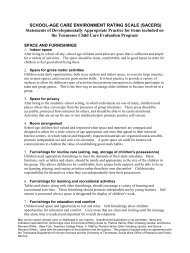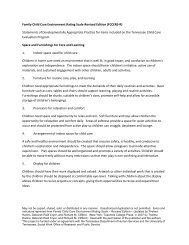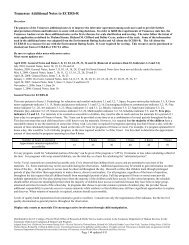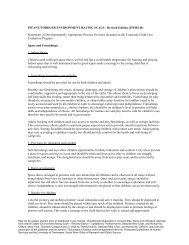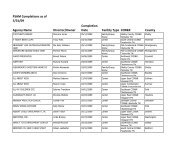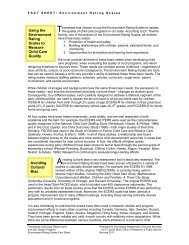Tennessee Additional Notes to SACERS Page 1 Updated 7/10
Tennessee Additional Notes to SACERS Page 1 Updated 7/10
Tennessee Additional Notes to SACERS Page 1 Updated 7/10
- No tags were found...
Create successful ePaper yourself
Turn your PDF publications into a flip-book with our unique Google optimized e-Paper software.
<strong>Tennessee</strong> <strong>Additional</strong> <strong>Notes</strong> <strong>to</strong> <strong>SACERS</strong>31. Staff supervision of children7.2 This indica<strong>to</strong>r requires that a person knowledgeable in a team sport or other activity (e.g., pottery) is available for instruction and guidanceso that the children can develop their skills. This means more than just supervising a game of tag, or coloring with markers.32. DisciplineNo score of 4 is possible.3.3 Discount if teacher/caregiver uses harsh punishment, threatens, or physically disciplines any child.7.2 In most cases “consultant” means someone from outside the program who specializes in the area of concern. The staff working in theprogram can benefit from an outsider’s perspective of a child who is experiencing difficulties. In a few cases, however, a program staff membercan count as the “consultant” if the person has a specialization in the area of concern and can give an unbiased perspective.34. Interactions between staff and parents3.2 Interpret this indica<strong>to</strong>r <strong>to</strong> read: “Parent conferences occur upon staff or parent request”3.3 Consider things such as parent handbook with open-door policy, welcome letters, etc. (TN 6/1/01)5.3 Take events such as picnics, parent meetings, open houses, etc. in<strong>to</strong> consideration. (TN 6/1/01)5.4 “Regularly scheduled” is defined as at least one time a year.35. Staff interactionScore this item N/A if there is only 1 staff member working with the children.5.2 Time for staff communication must not distract from responsibilities with children. (TN 7/20/01)37. ScheduleIf a schedule varies throughout the week, base your scores on what the children experience most of the time. For example, if the Fridayschedule is more relaxed, while the rest of the week is more restricted due <strong>to</strong> time for homework, then base the score on the four days of themore rigid schedule.3.2 The posted schedule must reflect all hours that children are in care regardless of the caregiving areas used.5.2 Score N/A if only one age group is in the program.5.3 Add <strong>to</strong> end of indica<strong>to</strong>r: “some teacher-initiated and some child-initiated.” (TN 7/20/01)7.2 Two <strong>to</strong> three field trips are required during the school year. More is expected during the summer.38. Free choice3.1 In some programs, opportunity for free choice may be very limited; at least 2 activities for free choice must exist. A program may allowchildren <strong>to</strong> choose a specific area <strong>to</strong> play in at the beginning of an activity period, and then the children cannot change their choice for the rest ofthe time. In this case, credit would be given for 3.1 (there is some free choice) but not for 5.1.40. Use of community resources3.1 Acceptable use of community resources can be having representatives from the resources come <strong>to</strong> the program. For example, a fire fightermay visit the program <strong>to</strong> explain about his or her job, or the Agriculture Extension Agency may provide special gardening activities on-site.Children do not have <strong>to</strong> leave the program site <strong>to</strong> give credit for a program's use of community resources.3.2, 3.3 Score yes if all community resources are used on-site, rather than off-site, and no permission is needed.Distributed by the UT College of Social Work Office of Research & Public Service under contract <strong>to</strong> the <strong>Tennessee</strong> Department of Human Services for the<strong>Tennessee</strong> Child Care Evaluation & Report Card Program.Adapted from School-Age Care Rating Scale, by Thelma Harms, Ellen Vineberg Jacobs, and Donna Romano White. (New York: Teachers College Press, ©1996by Thelma Harms, Ellen Vineberg Jacobs, and Donna Romano White.) Used with permission of the publisher and the authors. All rights reserved. This project isfunded under an agreement with the <strong>Tennessee</strong> Department of Human Services and the University of <strong>Tennessee</strong>, Social Work Office ofResearch and Policy Services.<strong>Page</strong> 8 <strong>Updated</strong> 7/<strong>10</strong>




